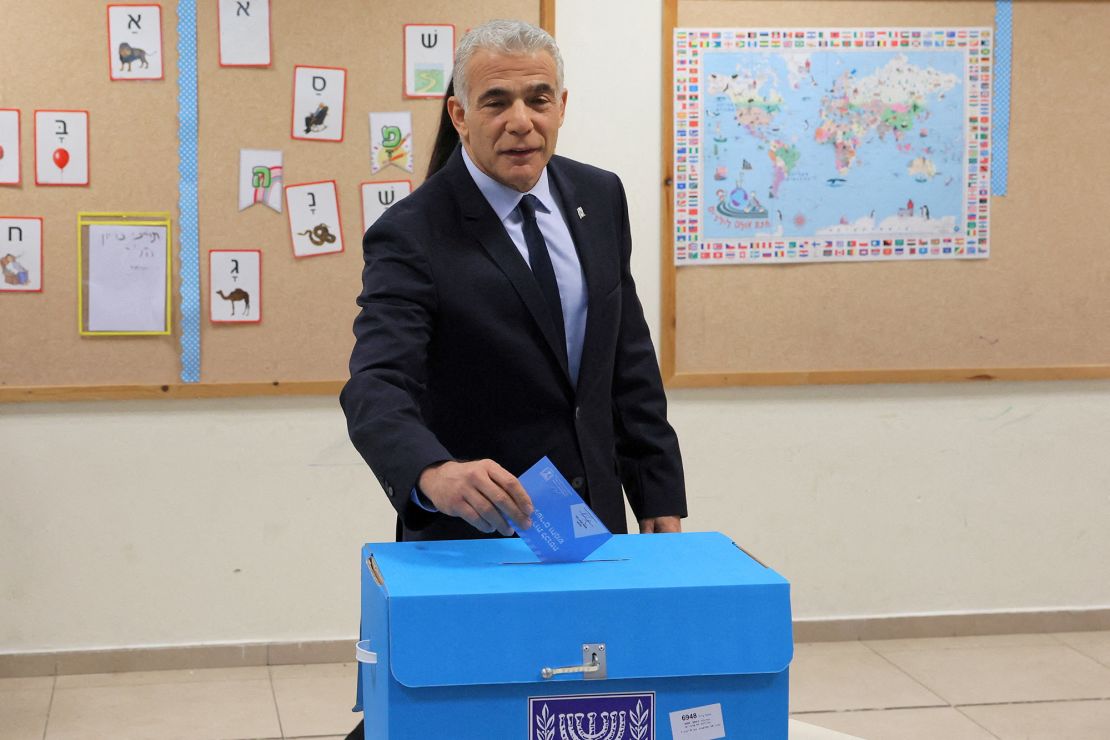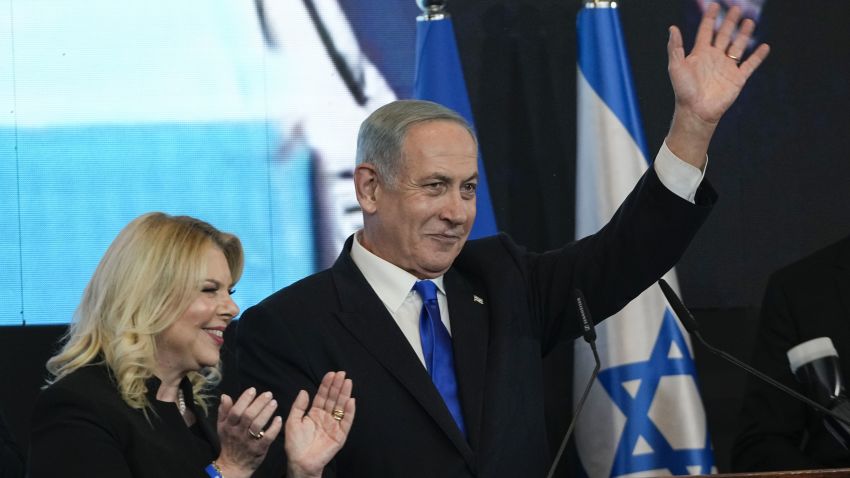Former Israeli leader Benjamin Netanyahu was on the verge of making a triumphant return to office in Israel, as initial exit polls suggested he may have scraped a narrow majority in the country’s fifth national election in less than four years.
If exit polls are correct – a big if – Netanyahu and his political allies appear to be on pace to win most seats in the Knesset, Israel’s parliament.
As expected, first exit polls from the country’s three main broadcasters suggested late on Tuesday that no party won enough seats to govern on its own, meaning that it will be necessary to build a coalition government.
The exit polls projected pro-Netanyahu parties would take 61 or 62 of the parliament’s 120 seats. The alliance is comprised of Netanyahu’s Likud party, Religious Zionism/Jewish Power, Shas and United Torah Judaism.
The alliance backing the current acting Prime Minister Yair Lapid, comprised of Yesh Atid, National Unity, Yisrael Beiteinu, Labor, Meretz and Ra’am, was poised to take 54 or 55 seats, according to the exit polls.
The Arab party Hadash/Taal, which is unlikely to support either side, was set to secure four seats, the exit polls suggested.
The election was marked by the highest turnout since 2015. The Central Election Committee said 71.3% of eligible voters cast their ballots, which was more than in any of the last four elections that produced stalemates or short-lived governments.
Netanyahu spent the closing weeks of the campaign barnstorming the country in a truck converted into a travelling stage encased in bulletproof glass. Pro-Netanyahu ads – and ads depicting his opponents looking shady – plastered the sides of buses.
It’s not yet certain that Netanyahu has made a comeback, after he was outmaneuvered following last year’s elections by Lapid.
The exit polls are only projections based on interviews with voters on Tuesday, not official results. The results can – and have in the past – change throughout the election night. Official results may not be final until Wednesday or even Thursday.
Once official results are in, President Isaac Herzog will invite the politician he deems most likely to be able to form a government to open coalition negotiations.

A Netanyahu return to the head of government could spell fundamental shifts to Israeli society.
A Netanyahu government would almost certainly include the newly ascendant Jewish nationalist Religious Zionism/Jewish Power alliance, whose leaders include Itamar Ben Gvir, once convicted for inciting racism and supporting terrorism.
If the exit polls turn out to be correct, the far-right alliance would more than double its representation in the Knesset. The grouping had six seats in the outgoing parliament; exit polls project that they have won 14 or 15 seats this time around.
When asked by CNN on Tuesday about fears he would lead a far-right government if he returns to office, Netanyahu responded with an apparent reference to the Ra’am party, which made history last year by becoming the first Arab party ever to join an Israeli government coalition.
“We don’t want a government with the Muslim Brotherhood, who support terrorism, deny the existence of Israel and are pretty hostile to the United States. That is what we are going to bring,” Netanyahu told CNN in English at his polling station in Jerusalem.
And Netanyahu allies have talked about making changes to the judicial system. That could put an end to Netanyahu’s own corruption trial, where he has pleaded not guilty.
Netanyahu himself has been one of the main issues not only in Tuesday’s election but in the four that preceded it, with voters – and politicians – splitting into camps based on whether they want the man universally known as Bibi in power or not.
Part of the difficulty in building a stable government over the past four elections has been that even some political parties that agree with Netanyahu on the issues refuse to work with him for personal or political reasons of their own.
Coalition building
Regardless of whether the exit polls are correct or not, they are only exit polls, not official results.
Getting the official results is going to take some time – they could be ready as soon as Wednesday, but it might be Thursday before the final makeup of Israel’s 25th Knesset is clear.
That’s partly because parties need to win at least 3.25% of the total vote in order to get any seats in the Knesset at all, a threshold established in an effort to make coalition building easier by keeping very small parties out of the legislature.
To determine how many seats each party gets, election officials first need to determine which parties crossed the threshold. Then they can work out how many votes it takes to win a single Knesset seat, and dole out seats to the parties based on the number of votes they got.
That’s the point where the real wheeling and dealing begins.
There’s a slim chance that even if the election results look like a deadlock, a clever negotiator can pull a surprise coalition together, the way Lapid did last year.
On the other hand, even if on paper, it looks like one leader or another has the backing to form a majority government, they’ll still need to cajole the smaller parties into coalition agreements.
And those smaller parties will have demands – control of particular ministries, funding for projects or programs important to their constituents, bringing in new laws or getting rid of old ones.
Potential prime ministers will need to balance out the competing demands of rival coalition partners, each one of whom knows that they hold the keys to putting a head of government into office.
And whoever becomes prime minister – if anyone does – will face the same problems.
The cost of living is skyrocketing in Israel as in so many other places, with energy and grocery bills spiking. An Israel Democracy Institute poll this summer found that a party’s economic platform was far and away the factor most often named as a reason for choosing who to vote for. Nearly half (44%) of Israeli voters said it was the most important factor, well ahead of the quarter (24%) who said party leader was the determiner.
Any new prime minister will also need to confront the conflict between Israel and the Palestinian militias that has claimed more lives on both sides this year than any time since 2015.
The Israel Defense Forces have been carrying out frequent raids for months into the occupied West Bank – particularly Jenin and Nablus – saying they are trying to apprehend known attackers and seize weapons.
As a strategy, it does not seem to have reduced the level of violence: at least one Israeli civilian was shot and killed near Hebron in the West Bank on Saturday, and others were wounded in the same incident – as were two medics who responded, one Israeli and one Palestinian. A day later, a Palestinian man rammed his car into five Israeli soldiers near Jericho. Both Palestinian attackers were killed, in a cycle of violence that the new prime minister will need to deal with – if, indeed, there is a new prime minister as a result of Tuesday’s vote.



















